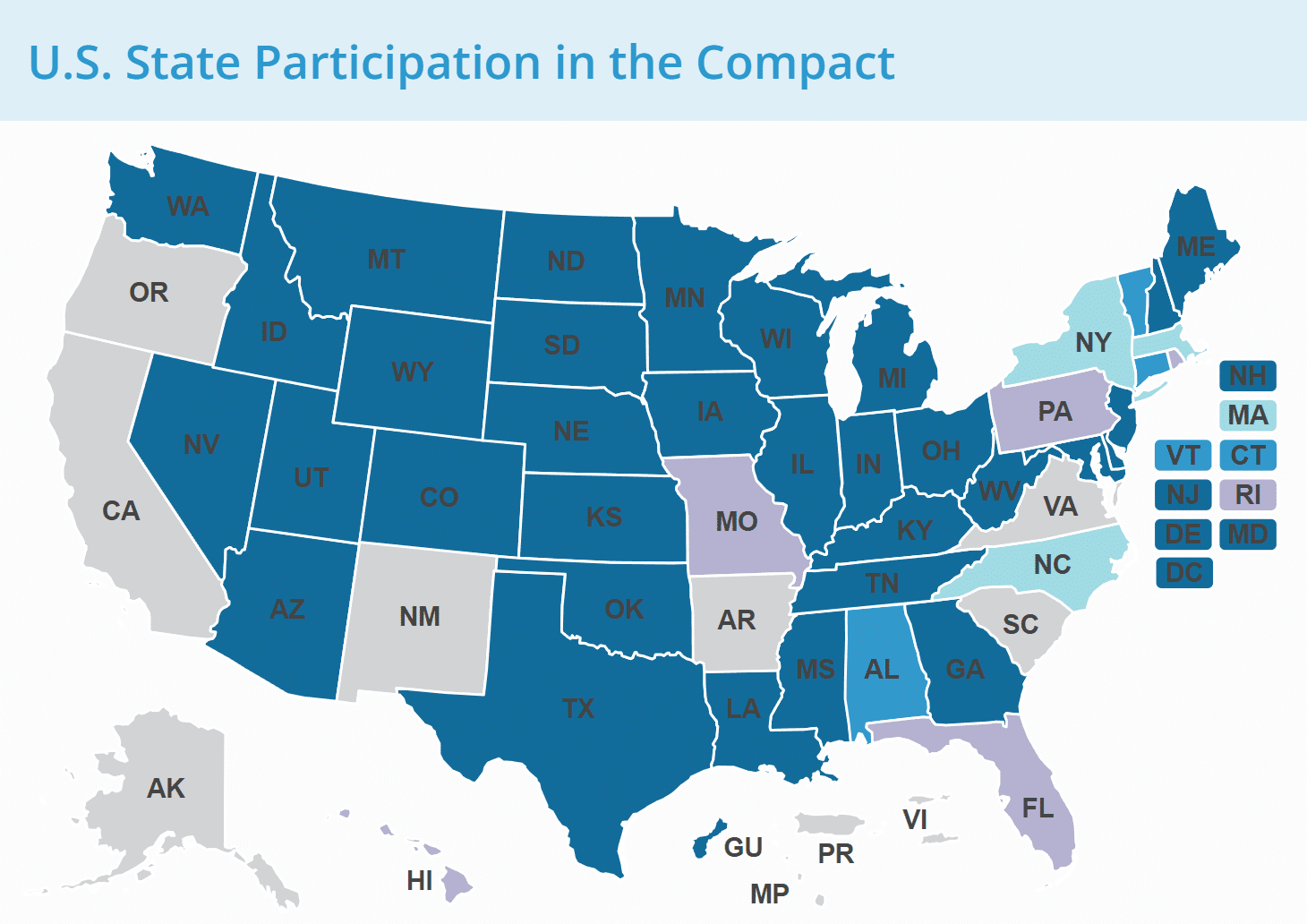Every state in the U.S. requires physicians to hold a valid license to practice medicine.
Regardless of specialty, physicians must undergo the medical licensing process before opening their practice or seeking employment with any type of hospital, clinic, surgical center, or medical practice.
Obtaining a medical license is a tedious process that often takes several weeks and requires you to:
- Pass the licensing exams in your state
- Submit an application
- Pay processing fees
- Provide a series of credentials, documents, and proof of your education and experience
Yet, this license is only valid in your current state, which means you’ll have to go over this rigorous process once you move to a new state.
Through IMLC, you can become a licensed physician in more than one state at the same time.
Here is our complete guide to the IMLC and how you can become a compact physician in multiple states.
Key Takeaways
- The Interstate Medical Licensure Compact (IMLC) simplifies the process of obtaining medical licenses in multiple states.
- Not all states are members of the IMLC, but the number is increasing, with 28 states currently participating.
- To be eligible, physicians must have a primary residence in a member state and hold an unrestricted medical license there.
- Physicians with a criminal history or disciplinary actions are not eligible to apply.
- Licenses obtained through the IMLC have to be renewed as per each state’s regulations.
- The IMLC is particularly valuable for physicians interested in telemedicine or locum tenens work in multiple states.
Table of Contents
What is IMLC?
IMLC stands for Interstate Medical Licensure Compact.
The compact was created by a team of medical board executives, attorneys, and healthcare administrators in 2014.
Their intent was to make it easier for physicians to acquire medical licenses in more than one state.
Applying and communicating with numerous medical boards in different states is time-consuming.
The IMLC saves physicians time and eases the burden of repeatedly undergoing the lengthy licensing process.
To date, the IMLC has assisted over 18,000 physicians across the U.S. in obtaining multiple state licenses.
Note: The Interstate Medical Licensure Compact Commission (not any state, local, or federal government entity) administers the IMLC’s rules and procedures.
Those who get medical licenses through the IMLC work under the jurisdiction of each state in which they hold a license.
However, the IMLC does not issue medical licenses; it streamlines the licensure process, thus granting physicians the flexibility to work in various places around the country.
Physicians who use the IMLC “retain licenses” do not receive a “compact license” that allows them to practice in multiple states.
Instead, they receive a separate document from every individual state.
The goal of the IMLC is to increase patient access to healthcare. (Particularly in rural/underserved areas that have difficulty attracting top-quality physicians to live in their state.)
For physicians committed to practicing medicine, this allows for greater opportunities to work locum tenens when needed and provide telehealth services virtually.
Related: The Pros and Cons of Physician Locum Tenens.
Which States Participate in IMLC?
Unfortunately, not all states are part of the compact. However, the number of participating states, known as Member States, is growing.
A total of 28 states are currently in the compact and nine more are working to pass state legislation so that they can join.

The following states and territories are Member States in the IMLC:
States and districts that have recently passed or introduced legislation to become member states include:
|
In Pennsylvania, Louisiana, and the District of Columbia, legislation to join the IMLC has passed.
Yet, there has been a delay in implementing the process.
The IMLC website provides a comprehensive map of all compact states and where non-member states are in the process.
However, if you live in Pennsylvania, DC, or Louisiana, where implementation has been delayed or stalled, you should contact your state board directly for up-to-date information.
The states that have not yet introduced legislation to become part of the compact include:
|
|
How Does IMLC Work?
Many physicians are eligible to apply for medical licensure through the IMLC, but some are not.
You can only apply for more licenses with the IMLC if your primary residence is in a member state and you currently hold a medical license in that state.
You need at least one current medical license to be eligible for the IMLC application.
The IMLC considers your primary state as your state of principal licensure (SPL).
Your SPL is the state where you have your primary residence and pay your state and federal taxes.
If you are self-employed in your own practice, at least 25% of the work you do must take place in your SPL.
But, if you are an employee of a hospital network or healthcare group, your main employer must also be in your SPL.
If you live in one state and work in another, that’s okay. Your SPL can be the state in which you hold a license and work or live.
As long as you hold a full and unrestricted medical license in your SPL, you may be eligible to apply for licenses in other states that are part of the compact.
For physicians licensed to work in Georgia, Vermont, or Oklahoma, the process is slightly more complicated.
These states do not qualify as SPLs, so you’ll need a second medical license from another member state to apply for licensure through the compact.
The IMLC categorizes these three states as non-SPL issuing states, so you cannot use a medical license from one of them to get more.
You can only gain licensure in one of these states if your SPL is another member state in the compact.
How to Become a Compact Physician
The IMLC works hard to streamline the process so you don’t have to contact every state individually.
If you live in an IMLC state, here’s your step-by-step guide to becoming a compact physician.
Meet Basic Eligibility Requirements
To meet the basic eligibility requirements, you must have:
- Graduated from an accredited medical school
- Passed all components of the USMLE, COMLEX-USA, or exam equivalent as required by your SPL
You must also hold a current specialty certification or a time-unlimited certification by an AOABOS or ABMS board
If you have a criminal history, you will not be eligible to take part.
You also need a clean medical license without any history of controlled substance actions, disciplinary actions, or pending investigations.
It is up to each individual to determine their own basic eligibility requirements. If you meet them, proceed with your application.
The IMLC charges a $700 non-refundable application fee.
However, if you don’t meet the criteria, the IMLC will reject your application, and you will still not be eligible for a refund.
Submit Your Application
After establishing your eligibility requirements, you can submit your application (and processing fee) to the IMLC.
At this point in the application process, your state of principal license will:
- Review your application
- Conduct a criminal background check
- Verify your qualifications
If you pass their review, your SPL will issue a formal Letter of Qualification (LOQ).
The LOQ is necessary in order to move forward in the process.
The letter of qualification is valid for one year from the date it’s issued. During that one-year period, you can apply for medical licenses from as many compact states as you choose.
IMLC makes it easy to apply for multiple licenses at one time, so whether you want a permit in two, five, or ten additional states, you can do so all at the same time.
It’s cost-effective to apply for as many state licenses as you need at the same time.
If you decide to apply for two now and another two more several months down the road, you’ll have to pay another $100 fee to IMLC.
For every state license that you apply for, expect to pay individual state licensing costs besides the $700 IMLC fee.
Individual state licenses range in price from $75 to $790.
Renew Your License as Required by State Law
Every state in which you hold a valid medical license will contact you when your license needs to be renewed.
If you applied for the first license through IMLC, you’d need to renew it through IMLC as well.
Once you submit your processing fee, the state issuing your license will contact you directly to confirm that you’re ready to renew.
See also: How to Work with a Physician Recruiter
How Many States in the Compact Should You Join?
According to the Federation of State Medical Boards (FSMB), of the nearly one million licensed physicians in the U.S., 15.5% hold licenses in two states.
6.6% hold licenses in three or more states.
IMLC data also shows that 80% of applicants from 2019-2020 obtained one or two additional state licenses, while 20% of applicants sought licensure in three states or more.
Whereas, 6% of IMLC applicants apply for licenses in seven or more states.
So what does this data mean?
This data shows that the IMLC is an effective way to obtain additional state medical licenses, even if you only need licensure in one other state.
Yet, the more states you want to hold a medical license in, the more valuable the IMLC becomes.
It’s a unique way to secure multiple licenses in the same amount of time it would take you to get one more medical license—if you applied directly through each state’s medical licensing board.
It is up to each physician to determine for themselves how many states they need licensure in.
Based on current application trends, most physicians using IMLC seek licensure in one, two, or three additional states. Only a tiny fraction seek licensure in more than three.
Collaborate With the Experts at Physicians Thrive
If you need a medical license in a second, third, or fourth state, visit the IMLC website now to start the process.
The IMLC can expedite your applications so that you can obtain multi-state licensure and start working in telemedicine or locum tenens positions.
For more information on the IMLC and how to get medical licenses in multiple states, contact Physicians Thrive now.
Subscribe to our email newsletter for expert tips about finances, insurance, employment contracts, and more!








































